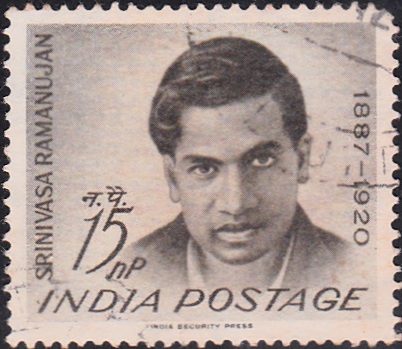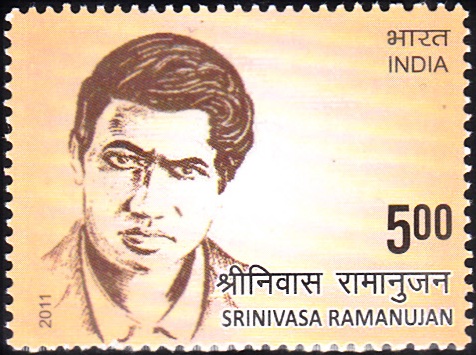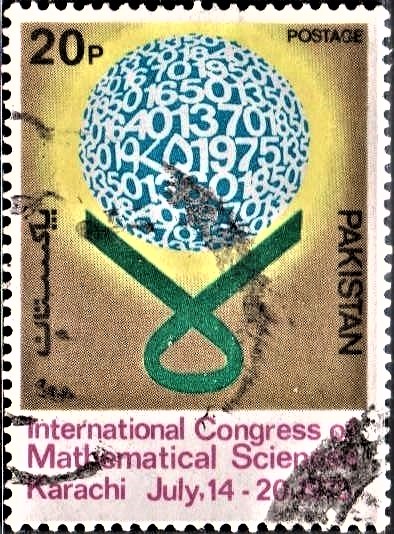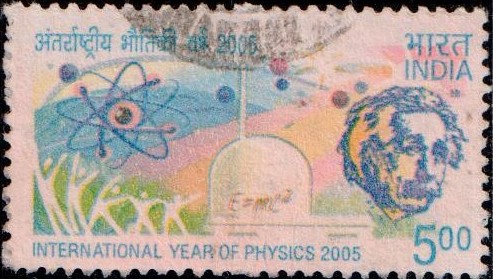
Srinivasa Ramanujan 1962
A commemorative postage stamp on the 75th Birth Anniversary of Srinivasa Ramanujan, an Indian mathematician, Fellow of the UK Royal Society, inventor of Ramanujan prime; Ramanujan theta function; partition formulae; mock theta functions :
 Issued by India
Issued by India
Issued on Dec 22, 1962
Issued for : The P & T Department feels privileged in bringing out a commemoration stamp in honour of this great son of India on the occasion of his 75th birth anniversary which falls on December 22, 1962.
Type : Stamp, Postal Used
Colour : Raw Sienna
Denomination : 15 nP
Size : 3.3 x 2.9 cms.
Perforation : 13½ x 14
Watermark : All over multiple ‘Lion Capital of Asoka‘
No. of Stamps Printed : 2.5 million
Set : 42 Stamps per issue sheet
Printing Process : Photogravure
Designed and printed at : India Security Press, Nasik Road
Name : Srinivasa Ramanujan
Born on Dec 22, 1887 at Erode, Madras Presidency, British India [now Tamil Nadu]
Died on Apr 26, 1920 at Kumbakonam, Madras Presidency, British India [now Tamil Nadu]
About :
- Writing about Ramanujan in The Discovery of India our worthy Prime Minister Shri Jawaharlal Nehru says: “Mathematics in India inevitably makes one think of one extraordinary figure of recent times. This was Srinivasa Ramanujan. Born in a poor Brahmin family in South India, having no opportunities for a proper education, he became a clerk in the Madras Port Trust. But he was bubbling over with some irrepressible quality of instinctive genius and played about with numbers and equations in his spare time. By a lucky chance he attracted the attention of a mathematician who sent some of his amateur work to Cambridge in England. People there were impressed and a scholarship was arranged for him. So he left his clerk’s job and went to Cambridge and during a very brief period there did work of profound value and amazing originality. The Royal Society of England went rather out of their way and made him a Fellow, but he died two years later, probably of tuberculosis, at the age of thirty-three. Professor Julian Huxley has, I believe, referred to him somewhere as the greatest mathematician of the century“.
- Ramanujan was a pure mathematician of the highest order, who worked on the theory of numbers, a theory which is the queen of mathematics. Another problem which engaged Ramanujan‘s attention was that of the partition of whole numbers. Nature had gifted Ramanujan with an uncanny memory which he put entirely at the service of numbers. As a result he remembered the idiosyncrasies of every one of the first 10000 integers to an extent that each one of them became his personal friend. He belonged to that school of mathematicians who consider that mathematics with its inaccessibility to application and consequent freedom from abuse like cricket is merely a game, one of manipulating symbols according to given rules.
- His work and the work of other mathematicians on Riemann’s zeta-function, done in another context, has now been geared to the technological mill. It has been applied to the theory of pyrometry, the investigation of temperature of furnaces aimed at building better blast furnaces.
- The mathematicians of the Atomic Energy Commission and the Tata Institute of Fundamental Research are looking into his collected works on mock-theta functions, modular equations, identities, theories of continued fractions and elliptic functions or some other of his numerous creations for possible use in atomic research.
- The great mathematician Hardy, Ramanujan‘s discoverer and collaborator in Cambridge, wrote : “I still say to myself when I am depressed and find myself forced to listen to pompous and tiresome people, ‘Well, I have done one thing you could never have done, and that is to have collaborated with both Littlewood and Ramanujan on something like equal terms.“
- No greater tribute could be offered to Ramanujan‘s mathematical genius.







